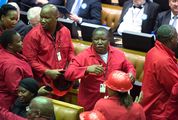ROY Douglas is the CEO of Advtech.
BUSINESS DAY TV: Advtech has made what it calls a quantum leap in its business due in part to a clutch of acquisitions and a significant ramp-up in its capex (capital expenditure) programme. Which appears to be paying off. Full-year headline earnings per share (HEPS) grew 27%, operating profit before interest was 75% while revenue has risen 40%. Roy Douglas is the CEO of Advtech and joins us now in the News Leader studio.
Roy, skipping ahead to 2018, you’ve put forward what you call a stretched target 100c in normalised earnings, which I assume has nothing to do with lycra, but its effectively doubling the earnings in the business in the next two years. That is quite a stretch.
ROY DOUGLAS: Yes, it is and we believe when we look at our growth plans that we have and the opportunities that we foresee in the future it certainly is a demanding target but we believe it’s a realistic target when we’ve looked at those opportunities. And we’re reasonably confident that we can get there.
BDTV: We’ve already seen some of that growth coming through in the past year as mentioned with those numbers. How much of that step change that you have seen in the business was inspired by Curro last year and its takeover attempt and how much just to the expansion strategy which was already in place before Curro came to the fore?
RD: The biggest portion of that was definitely what was already in place and being worked on. It’s difficult to deliver a quantum change such as we’ve done this year, just in a very short space of time. So these were projects that we’ve been working on, it’s a combination of our growth plans in our existing businesses coming to fruition and, of course, those acquisitions that we were able to make and we’ve worked on those for a while.
BDTV: And do you think it vindicates the position you took when Curro made its approach last year?
RD: I believe it does. Yes I think it’s an indication that there was significantly more upside potential in the business than was perhaps being realised at that time.
BDTV: But going back to what you have set yourselves as a target in the next two financial years, how are you going to get there and is it achievable, for example, with the capital that you have in your books at the moment, are you going to have to raise more money in order to make more acquisitions to get there?
RD: No. We also during the course of this year did an R850m rights issue which was very positively received by the market. And we’ve spent a significant amount of time restructuring the balance sheet which we now believe is in a very healthy state. We’ve put into place long-term borrowings. Our gearing has gone to 51% which we believe is a comfortable position and we have adequate headroom to pursue both our own organic growth plans plus leave us a little bit in spare in case we see some opportunities in the marketplace, which we’re sure will come around.
BDTV: So you don’t think you need to do any more than what you’ve done?
RD: Not at this point in time. Obviously, it’s difficult to predict with any degree of certainty. If there are some very large and very attractive acquisitions for us to pursue, then that might call us to go back to our shareholders. But they’ve always indicated to us that they would be more than positive about a project if it was well justified and that they would be prepared to back the business in that sense.
BDTV: Any of the three divisions in particular where you see that growth coming from? Where are you looking ... where are the quick wins?
RD: Definitely in both our schools and tertiary businesses where the underlying demand is very strong. Now if you look not only in SA, but also in Africa, urbanisation, the demographic dividend, the emerging middle class and reasonably good growing economies, all lends itself to a significant demand for education. So not only are we looking in SA, but we’re also looking into Africa as well and we’re quite excited about the opportunities that we see there.
BDTV: I wonder if these opportunities aren’t overstated ... we’ve spoken to a couple of economists ... Chris Bekker did very interesting research on the overstated size of the middle class in Africa ... do you have the research to back up what you want to do north of SA?
RD: I think definitely the commentary of late was that perhaps those figures were overstated, perhaps people were a little too enthusiastic about the size of the African middle class emerging. But it is a large continent with a growing population and if you look at our market share in SA, which is still relatively small given the total number of school-going pupils or tertiary-enrolled students, we don’t need a very big portion of that market to make a significant change in our size. So yes, it is probably true that perhaps those markets are not quite as big as people perceived, perhaps some of the experiences more recently have been a little disappointing, but we think there are some fundamental differences in education. There is an inherent strong underlying demand for education in Africa, and we believe that there are opportunities for us, and certainly our initial research ... we’ve done quite a lot of fact finding in that area and we’re excited by those opportunities. I don’t think we should get carried away by any stretch of the imagination, but it would probably be amiss of us if we weren’t keeping a very close eye on the continent and what was perhaps potential for us in those areas.
BDTV: You’ve had some success in the mid-fees schools market ... a lot of growth coming through there. Is that really going to be targeting both in SA but also as you expand further across the continent?
RD: Yes, certainly. What we are very determined to do is to retain our commitment to academic excellence. That’s at the centre of our product offering, it’s at the centre of what we do, but, yes, we will probably be looking at the mid-fee sector as the area of larger-scale opportunity, certainly. But as we expand into those African markets there is certain opportunity in the premium areas as well.
BDTV: What about distance learning, you seem to be quite excited about this. What is the scope for it, how big is the size of the business, how much money are you making from it already, especially as PSG has quite a significant distance learning operation ... and, of course, PSG being the owner of Curro (that’s an aside comment)?
RD: Distance learning is an area that we have not participated in to any great extent previously. The developments in technology enables us to pursue those distance opportunities to a greater extent. We’re very excited. We’ve invested significantly in our learning management system. We’ve opened the Polokwane campus, which is in fact a blended learning offering and that’s a very exciting development for us. It’s enabled us to reach a new sector of the economy, offer quality education at a very affordable price in a combination between face-to-face and distance learning. And that’s a model that we intend to roll out very aggressively in the South African market and, of course, lends us an opportunity into Africa as well. So I would say that our move into distance is encouraged by the use of technology in an appropriate manner because we still believe that face-to-face instruction is very important, but supplemented by technology in the distance area is an exciting new area for us.
BDTV: Just a quick word on the resourcing division, any fall out last year particularly with the new labour laws which came in and the effect that had on contract workers?
RD: That doesn’t affect us because we tend to operate in the upper side of the market where the legislation is not effective. So our resourcing business, we believe, has delivered an outstanding result in a very tough economy. That’s really as a result of its single-minded focus on specialist niche positions which are always in demand, even in economic downturns. They’ve taken a lot of care over their cost structures and they have a very clear and focused model that’s delivered great value this year. We’re particularly proud of them.




















Login OR Join up TO COMMENT